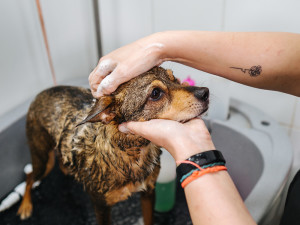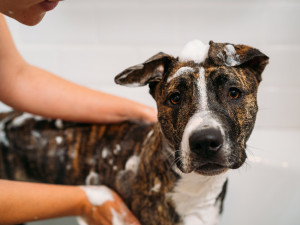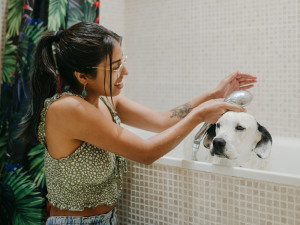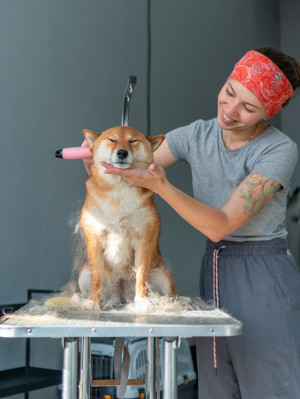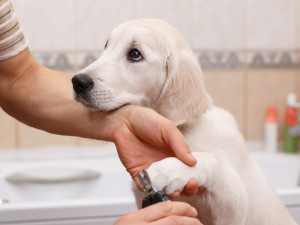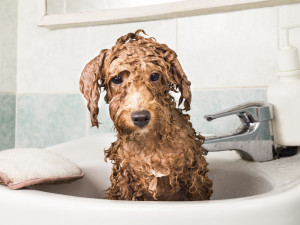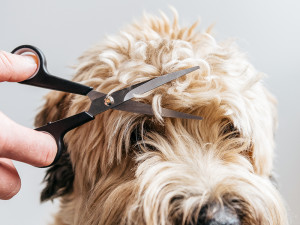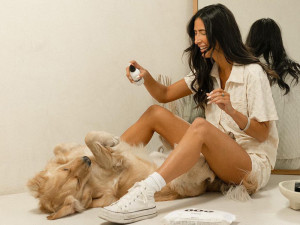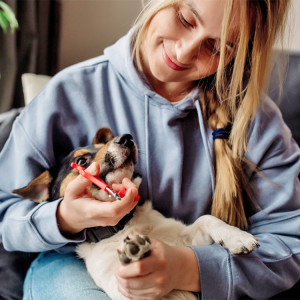What Can I Wash My Dog With?
They would prefer no bath at all, but we’re not asking them.

Share Article
In This Article:
Can I Use Regular Shampoo on My Dog? What Can I Wash My Dog With At Home? Addressing Specific Concerns Proper Bathing Techniques for Dogs Frequently Asked Questions
Choosing the right product to wash your dog is crucial for maintaining their skin and coat. While there are safe alternatives that can be used in a pinch, specially formulated dog shampoos are the best choice.
Can I use regular shampoo on my dog?
Although your lavender-infused, volumizing, anti-frizz shampoo might be a holy grail product for you, it’s not ideal for your dog. Dogs should not be bathed with human shampoo. Human skin and dog skin differ in pH and thickness, so they require different products. Human skin is more acidic than dog skin. The epidermis (outer layer) of dog skin is three times thinner than human skin, making it more sensitive to unsuitable ingredients. Using human shampoo on a dog’s skin is likely to result in dryness, irritation, and weakening of the skin’s protective barrier. Human shampoo can also screw with the normal population of bacteria and risks overgrowth of unwanted organisms.
If your dog unexpectedly rolls in something filthy and you're out of dog shampoo, you might wonder, Can I use human shampoo on my dog just this one time? The answer is: Try not to. It’s better to give your dog a hardy rinse with water until you can get dog-specific shampoo. If you really need that lather, though, opt for baby shampoo.
What can I wash my dog with at home?
When bathing your dog at home, using dog shampoo that is specially formulated for canine skin is always the best bet. This ensures that the shampoo has the correct pH level and is less likely to cause irritation. There are tons of options to address specific concerns, like anti-itching, antibacterial, and sensitive skin formulations.
Some dog parents wonder what they can wash their dogs with besides dog shampoo. While dog shampoo (over the counter or prescription) is recommended, alternatives that are often discussed include:
Apple cider vinegar
In research settings, apple cider vinegar (ACV) has been shown to have antimicrobial and antifungal properties, but there is limited evidence of its effectiveness for dogs. Anecdotally, people report success with using ACV diluted with water (1:1) to ease itchy dog skin and clean yeasty dog ears. Applying ACV to skin that has abrasions from constant scratching can burn.
Baby shampoo
Human baby shampoo is known to be gentle on the skin and safe if it makes accidental contact with eyes. Some dogs may tolerate baby shampoo well, but it’s not recommended for regular use. It is still formulated for human baby skin, which is more acidic than dog skin.
DIY shampoo
Itchiness can leave some dogs and their parents at their wits’ end. Seeking to make a DIY dog shampoo for itchy skin may be tempting for some puppy parents, but using a veterinary-recommended shampoo is recommended for pups with skin issues. Bathing can provide relief, but DIY shampoos may not be as stable or effective as other options. If your dog is itchy, be sure to rule out specific conditions like parasites, infections, and allergies.
Addressing specific concerns
“Skin stuff” is one of the most common reasons for pet parents to book an appointment with their vet. Dogs get itchy, they get parasites, and their skin can get pretty smelly. Most skin issues require some degree of at-home management, including bathing. For faster, more effective resolution, use the products your vet recommends and follow their instructions.
What can I wash my dog with to kill fleas?
Preventive measures like monthly treatments are much better strategies than washing live fleas off your dog. Bathing can provide temporary relief, but it won’t stop fleas from hopping onto a dog an hour later. There are dog shampoos formulated specifically to kill fleas. Not all dogs can tolerate these shampoos though; they may be too harsh for small, young puppies.
Small puppies with flea infestations can be bathed with dish soap to remove live fleas, if it’s deemed safe to do so by your veterinarian. A heavy flea burden can cause anemia in tiny pups, and bathing may cause too much stress, so talk to your vet about the best way to rid your puppy of fleas.
What can I wash my dog with if they get sprayed by a skunk?
Skunks are actually pretty docile creatures, but they can be protective of their young or get fed up when dogs get too curious. A skunk spray to the face can cause serious health problems in dogs, including eye trauma, vomiting, breathing issues, and anemia. For body sprays, bathing is in order. Don’t waste your time with tomato juice; it doesn’t work. There are commercial dog shampoos that are specifically designed to get a dog of skunk smell. If that’s not available to you, try this:
Dog de-skunk ingredients:
one quart of three percent hydrogen peroxide
1/4 cup baking soda
one to two teaspoons of dishwashing liquid
Dog de-skunk instructions:
Mix the ingredients together in a bowl or bottle and apply the mixture to your dog’s fur, avoiding the eyes. Lather the mixture into the fur and let it set for about five minutes, then rinse thoroughly with warm water. Repeat as needed. Know that the hydrogen peroxide in the mixture can lighten dark fur and will bleach clothing and towels. Also, dump any unused mixture — do not store it! The mixture will continue to react in a closed container and can explode.
Proper bathing techniques for dogs
Some dog parents go for regular trips to a professional groomer, while others opt to tackle bathing themselves. Here are some tips for tackling bathing at home:
Gather the proper supplies: Have a dog shampoo that’s appropriate for your dog’s fur and any underlying skin conditions. Have plenty of towels and a brush if your dog’s coat calls for it.
Prepare a safe space: Small pups can be bathed in sinks, while larger dogs can be washed in a tub. Bathe your dog in a secure area where they are able to stand without sliding around and potentially hurting themselves. Use a grippy mat or a towel to provide a little traction under their paws.
Use warm water: You may enjoy scalding hot baths or feel refreshed after an ice cold shower, but your dog does not. Use warm, tepid water to make your dog’s bath comfortable.
Lather up: Wet your dog from neck to tail, apply an adequate amount of shampoo, and work it into your dog’s coat to create a lather. Don’t shampoo your dog’s face in order to avoid getting shampoo in your dog’s eyes.
Rinse thoroughly: Rinse your dog thoroughly, being careful not to get water into their eyes, ears, or nose. Dried shampoo can cause skin irritation, so be sure to wash it all away.
Dry your dog: Your dog’s messy post-bath shakes remove a surprising amount of water, but they still need to be dried with a towel or blow dryer. If using a blow dryer, use a cool setting and hold it several inches away from your dog’s fur.
Give lots of praise: Bath time can be scary for some dogs, so be sure to give them lots of praise, treats, and snuggles to reassure them that they’re safe.
FAQs (People also ask):
How often should I wash my dog?
How often your dog needs a bath depends on their coat type, lifestyle, and condition of their skin. Dogs tend to need more frequent bathing if they have long or no fur, spend a lot of time outdoors, or have underlying skin conditions.
Can I use dish soap to wash my dog in an emergency?
Dish soap is not the best alternative to dog shampoo and will strip protective oils from the skin and fur. Dish soap may be used in a few cases including washing off skunk spray and removing fleas from dogs too small for flea treatments (under vet guidance).
References

Dr. Alycia Washington, DVM, MS
Alycia Washington is a small-animal emergency veterinarian with over 10 years of experience based in North Carolina. She works as a relief veterinarianopens in new tab and provides services to numerous emergency and specialty hospitals. She also works as a veterinary writer with a focus on educating pet parents.
Related articles
![Woman carefully cleaning a dog in a bathtub.]()
How to Groom Your Dog at Home: the Complete Guide
Spa days can happen at home.
How Often Should You Groom Your Dog?
Just make sure you spell out “B-A-T-H.”
![The-Wildest_Editorial_Puppy-grooming-tips_Hero_1000x750_v01.jpg]()
How to Groom Your New Puppy
Celebrity dog groomer Jess Rona’s puppy grooming pro tips.
![greyhound dog being washed in tub]()
Lather, Rinse, Repeat: The Ultimate Dog Grooming Guide
Keep your dog well-groomed but trust trims to the pros.
![A person giving a dog a bath in a bathtub.]()
Tips on How to Brush and Bathe Your Dog from a Pro
Groomer extraordinaire Robyn Michaels explains best brushes and how to keep your pup well-groomed.
![A dog getting his face scrubbed with soap.]()
7 Ways Baking Soda Can Keep Your Dog (And Your House) Clean
This pantry staple is about to become your new secret cleaning weapon.
![A wheaten terrier getting a haircut to remove the hair from over his eyes]()
10 Best Grooming Products for Your Pup
Tools to keep your pet looking so fresh and so clean, from bamboo hair brushes to biodegradable wipes.
![Woman sitting on the floor laughing while spraying DOG by Dr. Lisa product on her golden retriever dog laying on its back on the floor next to her]()
Are You Overwashing Your Dog?
Probably, according to Dr. Lisa, a celebrity vet who just launched a line of eco-conscious dog grooming products.
![woman smiling while trimming dog’s nails]()
What Are the Best Dog Nail Clippers?
Finally—you won’t dread at-home grooming time.
![A dog getting a bath]()
How Often Should You Wash Your Dog?
“If your dog is stinky or looks dirty, wash ’em!” Plus more pro tips from LA dog groomer Jess Rona.


